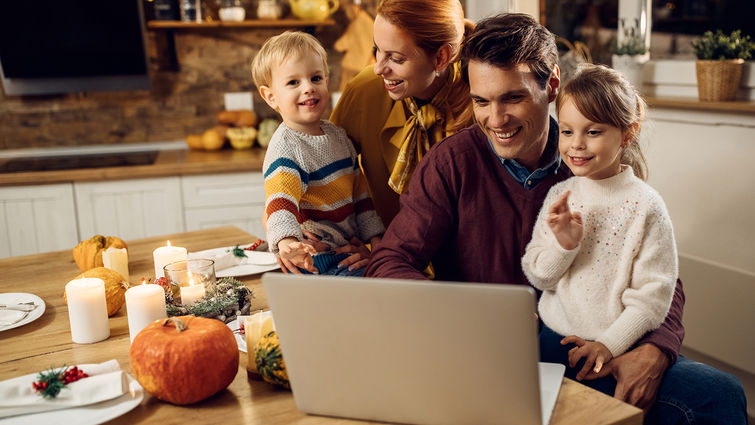
Family gatherings and celebrations with friends are joyous traditions for many during the holiday season. However, with COVID-19 cases on the rise across the United States, some may wonder how to safely celebrate Thanksgiving and Christmas during flu season and the pandemic.
April Wilson, MD, MPH, FACPM, preventive medicine specialist and Loma Linda University School of Medicine department chair, says it may be difficult to accept that holiday celebrations might look different this year, but it will be worth it to keep you and your loved ones safe.
Wilson shares a few ideas, based on guidance from the Centers for Disease Control and Prevention (CDC), on how to celebrate with reduced risk of flu and COVID-19 transmission.
Change-up your holiday meal
Although enjoying a meal together is central to most celebrations, Wilson offers these low- to moderate-risk alternatives:
Eat holiday meals only with people in your household (low risk)
Around the holidays, Wilson encourages online grocery shopping rather than shopping in person. “Avoid crowded grocery stores and increased risk by not shopping on the busy days leading up to Thanksgiving and Christmas,” she says.
Families and friends who plan to spend time together can also quarantine in advance of the holiday celebration. “If they do this for 14 days ahead of the gathering and everyone is asymptomatic, the risk of COVID-19 transmission should be quite low,” Wilson says.
Dine together virtually (lowest risk)
Consider hosting a celebration virtually through online meeting or phone video platforms. You can even prepare food for family and friends and deliver it without person-to-person contact before the party. Not able to cook and deliver? Wilson suggests an alternative of ordering food from your family’s favorite restaurant and having it delivered.
Host a small outdoor dinner (moderate risk)
In addition to social distancing, hand hygiene and wearing a mask while not eating, Wilson says there are other key components to maintain a moderate risk level during your outdoor gathering:
-
Keep your guest count low and time together at a minimum. Wilson says small gatherings should follow the CDC and state guidelines. In California, gatherings should be held outdoors with no more than three family households at a maximum celebration duration of two hours.
-
While at a holiday celebration, be sure to stay within your “pod.” Guests should dine only within their household and be seated at least six feet from other households.
-
Skip the potluck and use disposable dinnerware. Wilson recommends households bring their own food and beverages. If the host is supplying the meal, avoid self-serve options and designate a “food server” who, while wearing a face mask and after washing hands, prepares each plate and delivers to dinner guests.
-
Use separate bathrooms or disinfect after each use. If possible, households should use separate bathrooms. Have just one bathroom? Wilson says to lay out disinfecting supplies in the bathroom for each guest to do a quick clean-up of common areas after use.
-
Disinfect common touchpoints frequently. Make sure to wipe down door handles and high-traffic surfaces on the hour — setting a timer makes it easy to remember. Also, be sure to have plenty of hand sanitizer available to your guests.
Avoid traveling long distances to attend any small gathering (high risk)
Gatherings with attendees who are traveling from different regions pose a higher risk than gatherings with attendees who live in the same area, according to the CDC.
Certain groups should avoid holiday gatherings altogether
If any guests are sick or have known to have or be around someone who has an active COVID-19 infection, they should avoid any group gathering, Wilson says. Those considered high risk for developing serious complications from the virus should likewise avoid in-person celebrations.
Skipping festivities doesn’t mean missing out on tradition
For those unable to attend a small celebration, consider other ways to add new meaning to a holiday. “There are many traditions old or new that can carry over to a virtual format with a little adjustment,” Wilson says. Bring in the season by singing Christmas carols or playing music using a video calling platform. “You could even make cookies, play games or wrap presents together in this way,” she adds.
“The act of celebration has a powerful effect on your mental well-being, which is an important aspect of immune system health,” Wilson says.
“I hope we can see these safety protocols as an opportunity to carry on holiday traditions in a different way or let it inspire us to create new ones,” she says.
